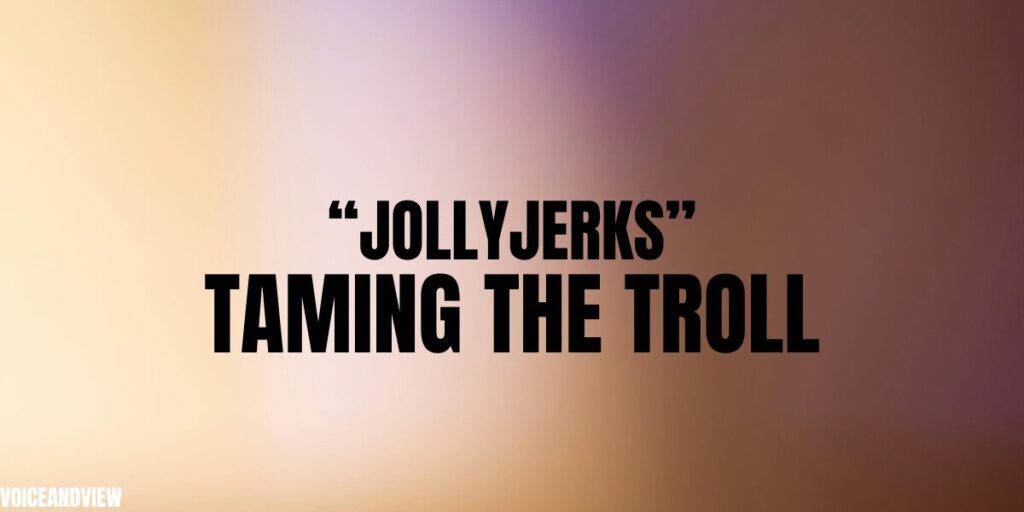The Ultimate Guide to Jollyjerks: Taming the Troll

Have you ever received a comment online that left you scratching your head? Perhaps it was a compliment laced with sarcasm, or seemingly supportive advice delivered with a condescending tone. These confusing encounters are likely the work of a “jollyjerk,” an increasingly common online persona.
Contents
Decoding the “Jollyjerk”
An individual who blends seemingly positive interactions with underhanded negativity. They might offer backhanded compliments (“That dress is…interesting. Really makes your eyes pop!”) or disguise insults as jokes (“Wow, you somehow managed to win that competition? Must’ve been beginner’s luck!”). Their behavior can be perplexing, leaving recipients unsure of their true intentions.
Why Do Jollyjerks Exist?
These are populate online spaces for various reasons. Some might crave attention and seek reactions, even negative ones, to feel acknowledged. Insecurity can also play a role, as veiled insults can be a way to mask self-doubt by putting others down. Additionally, some might have a misguided sense of humor, mistaking sarcasm and negativity for wit.
The Impact of Jollyjerks
Interactions with them can be frustrating and confusing. Their mixed messages can create doubt and make it difficult to know how to respond. The constant barrage of negativity, even if disguised as humor, can have a detrimental effect on online communities, fostering negativity and hindering genuine communication.
By understanding the characteristics and motivations behind them, we can navigate online interactions with greater awareness and protect ourselves from their manipulative tactics. This approach empowers us to foster positive and respectful online communities.
Unmasking the “Jollyjerk”: Behavior and Motivations
Jollyjerk, the online enigma, thrive on confusing positivity with negativity. Their signature moves leave you wondering about their true intentions. Imagine receiving a “compliment” like, “That outfit is…unique. It takes a certain kind of confidence to pull it off.” While it sounds complimentary on the surface, the hidden barb leaves you feeling belittled and unsure how to respond. Did they genuinely like your outfit, or were they subtly mocking it? The ambiguity creates confusion and undermines your confidence.
Sarcastic support is another weapon in their arsenal. Phrases like, “Oh wow, you actually finished that project? Good for you!” might sound supportive at first glance. However, the dripping sarcasm undermines your accomplishment.
They often frame insults as jokes, further blurring the lines. For instance, after losing a game, someone might say, “Wow, you really choked under pressure there!”. The playful tone masks the underlying insult, leaving you questioning your skills and potentially feeling attacked.
These confusing tactics create a situation where you might question your own perception or feel manipulated by the mixed messages. By recognizing these behaviors, you can better understand the “jollyjerk” and navigate online interactions with greater awareness. You’ll be able to identify their manipulative tactics and choose how to respond, empowering you to create a more positive online experience.
Motivations Behind the Mask
Unraveling the enigma of the “jollyjerk” online requires understanding their motivations. These individuals leave you bewildered with their confusing blend of seemingly positive remarks laced with negativity. Here’s what might drive them:
Attention Seekers: Some jof them crave attention, even the negative kind. They might use sarcastic comments or backhanded compliments to get a reaction, even if it sparks conflict. Their primary goal is to be acknowledged, regardless of the response.
Masking Insecurity: Insecurity can be a hidden motivator. By putting others down with disguised insults or veiled negativity, a jollyjerk might attempt to boost their own self-esteem.
Misguided Sense of Humor: Humor is subjective. A jollyjerk might mistake sarcasm and negativity for wit, completely oblivious to the impact it has on others. They might think they’re being funny when their comments are actually hurtful or discouraging.
While these are potential motivations, the reasons behind a jollyjerk’s behavior can be complex. However, recognizing these patterns equips you to decipher their mixed messages and navigate online interactions with greater awareness. You’ll be able to identify their manipulative tactics and choose how to respond, empowering you to create a more positive online experience.
Taming the Troll: Strategies for Dealing with Jollyjerks
Strategies for Self-preservation
Encountering jollyjerks online can be frustrating. Here are some tips to protect yourself and navigate these interactions effectively:
- Don’t take the bait: The key is to avoid getting drawn into the negativity. Recognize the manipulative nature of their comments and resist the urge to respond defensively.
- Respond with humor (carefully): Sometimes, deflecting with lighthearted humor can disarm a jollyjerk. A simple “Thanks for the feedback!” or a playful response that acknowledges the sarcasm can take the wind out of their sails. However, avoid using sarcasm yourself, as it can be misconstrued.
- Direct but polite approach: If the behavior persists, a direct but polite approach can be helpful. Briefly state that their comment seems dismissive or hurtful, and calmly request they rephrase it constructively.
- Disengage when necessary: There are times when disengagement is the best strategy. If the jollyjerk becomes aggressive or resorts to personal attacks, simply walk away from the conversation. You don’t owe them a response.
When to Walk Away: Recognizing Toxic Behavior
While some jollyjerks might be oblivious to the impact of their words, others might be intentionally trying to manipulate or belittle you. Here are some signs to watch out for:
- Escalating negativity: If their comments become increasingly hostile or target sensitive topics, it’s best to disengage.
- Personal attacks: Personal attacks and insults are never okay. Don’t engage with someone who resorts to such tactics.
- Gaslighting: Gaslighting is a manipulative tactic where someone tries to make you question your own reality. If a jollyjerk constantly contradicts your perception or tries to downplay your feelings, walk away.
By recognizing these red flags and employing the strategies mentioned above, you can effectively navigate interactions with them and protect yourself from their negativity. Remember, online interactions should be respectful and positive. Don’t be afraid to walk away from situations that drain your energy or violate your boundaries.
Conclusion:
Confused by someone leaving snarky compliments or offering “supportive” jabs online? You’ve likely encountered a “jollyjerk,” a web dweller who blends seemingly positive interactions with underlying negativity. From backhanded compliments to disguised insults, their behavior can be perplexing and frustrating. But fret not! By understanding the “why” behind the “jollyjerk” – attention seeking, masked insecurity, or misguided humor – we can navigate these interactions effectively. Employ strategies like deflecting with humor, politely requesting constructive phrasing, or simply disengaging when necessary. Remember, online interactions should be respectful. Recognize manipulative tactics like escalating negativity, personal attacks, or gaslighting, and walk away from situations that drain your energy. Let’s choose kindness and foster positive online communities where genuine communication thrives.
FAQs:
FAQs: Decoding the Online Prankster
Q: What is a jollyjerk?
A. He/She is someone online who mixes seemingly positive interactions with underlying negativity. They might leave backhanded compliments, offer “supportive” remarks laced with sarcasm, or disguise insults as jokes. This confusing behavior can leave you wondering about their true intentions.
Q: Why do people act like jollyjerks online?
There are a few reasons why someone might adopt a jollyjerk persona. They might crave attention, even negative reactions, to feel acknowledged. Insecurity can also play a role, as veiled insults can be a way to mask self-doubt by putting others down. Additionally, some might have a misguided sense of humor, mistaking sarcasm and negativity for wit.
Q: How do jollyjerks affect online interactions?
Their mixed messages can be frustrating and confusing. You might question your own perception or feel manipulated by their behavior. The constant barrage of negativity, even if disguised as humor, can create a hostile environment and hinder genuine communication.
Q: How can I deal with a jollyjerk online?
The key is to avoid getting drawn into the negativity. Here are some strategies:
- Don’t take the bait: Recognize the manipulative nature of their comments and resist the urge to respond defensively.
- Respond with humor (carefully): Sometimes, lighthearted humor can disarm them. A simple “Thanks for the feedback!” or a playful response can take the wind out of their sails.
- Direct but polite approach: If the behavior persists, calmly request they rephrase their comment constructively.
- Disengage when necessary: If they become aggressive or resort to personal attacks, simply walk away from the conversation.
Q: When should I walk away from a jollyjerk?
There are times when disengagement is the best course of action. Look out for signs of manipulative or toxic behavior, such as:
- Escalating negativity: If their comments become increasingly hostile, it’s best to walk away.
- Personal attacks: Don’t engage with someone who resorts to insults or attacks your character.
- Gaslighting: This is where someone tries to make you question your own reality. If a jollyjerk constantly contradicts your perception or tries to downplay your feelings, walk away.
Q: Where can I learn more about online communication?
By understanding healthy online communication practices, you can better navigate interactions with all types of online personalities. Explore resources on digital communication and online safety to empower yourself to create a more positive and respectful online experience.





